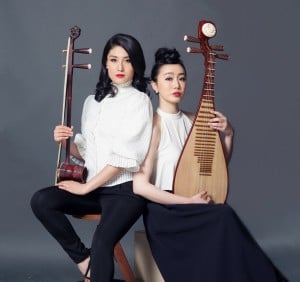Blog Archive
Behind The Music

FJ Music
“For me, pipa is not just an instrument,” said Jiaju Shen of FJ Music, a cutting-edge duo dedicated to integrating Chinese musical language with other genres. “It’s my friend, my life, and my soul mate. I cannot live without it.”
The Tenement Museum’s 2016 gala, Celebrating Our Immigrant Past and Our American Future, will take place on June 7 at Spring Studios in Tribeca. The Museum’s gala is our largest and most exciting annual benefit event, attracting over 500 guests from New York’s business, civic, educational, and philanthropic communities, and is currently on track to raise over a million dollars towards the Museum’s work.
What makes the event so special is the fantastic opportunity to showcase the Tenement Museum’s success to our most dedicated supporters—and the chance to work with talented people who have unique immigrant stories of their own, such as this year’s entertainers FJ Music and João Kouyoumdjian.
“My paternal grandfather used to play violin as a hobby,” said Kouyoumdjian, a Julliard-trained classical guitarist with mixed Brazilian and Armenian ethnic heritage. “He was an immigrant from Armenia and orphan from a genocide that victimized millions of Armenians. I will never know whether his cultural background was connected to an arts tradition.”

Joao Kouyoumdjian
Born and raised in Brazil, Kouyoumdjian has played guitar for over twenty years, drawing inspiration from his mentor, Brazilian guitarist Paulo Martelli. Kouyoumdjian first moved to America to study at Julliard in 2007, and balances a performing career with teaching music at Newark School of the Arts. His rich heritage has provided a complex dimension to his career, giving him the opportunity in 2012 to perform with the Armenian Philharmonic Orchestra in Yerevan, Armenia for the 20th anniversary celebration of diplomatic relations between Brazil and Armenia.
However, from very early on, his greatest passion has a more familiar name: the music of Johann Sebastian Bach.
“(Bach’s) music really transcends you to a higher state mind and spirit,” Kouyoumdjian said. “When I was starting classical guitar lessons, my teacher recorded a few tapes that he thought should serve as reference for my studies. I had to travel for 3 hours by bus to take lessons and during those travels I listened to those tapes…without great enthusiasm, to be honest. However, in one of those trips one of the recordings caught my attention. I didn’t have the tape cover with me on the bus so I didn’t know what it was. I kept listening to the same track over and over and over, rewinding the cassette tape continuously. I couldn’t get enough of its beauty. When I got home I found the tape’s cover and track list: it was Göran Sollscher performing music by J. S. Bach. It was a completely transformative experience, and I was never the same.”
Rather than re-interpret beloved classics, FJ Music—Chinese virtuosos Feifei Yang on erhu and Jiaju Shen on pipa—has a different goal: to forge new ground.
“I have tried jazz, pop, rock, funk, and bossa nova with my erhu, so I would say that I like playing fusion music the most,” said Yang. Shen agreed: “Traditional pieces let the audience know what Chinese music sounds like. Since fusion is a combination of eastern and western elements, it’s a key for American audiences to open the door to Chinese instruments, music, and culture.”
Both the erhu and the pipa have incredible significance for Yang and Shen. The pipa, similar to a lute, originated two thousand years ago and became popular during the Tang dynasty. For Shen, it represents her Chinese culture. While Yang first chose a liuqin to learn at age 9, her mother switched her to an erhu—which is two-stringed and bowed, sometimes called a Chinese violin—because there were more opportunities to play solos. Later, she learned that her great-grandfather used to play the erhu when her mother was young.
Though they met in America, Yang and Shen moved here from China for similar reasons—curiosity and a thirst for broader experience—with both leaving behind job opportunities in China. Shen came to New York City to get her master’s degree in arts and culture management at Pratt Institute, and Yang chose the city because of its prominence in American TV shows. They have eagerly explored new opportunities and thrived in their cultural environment.
“Musicians here really play music with heart, instead of just studying,” Shen said. “They use music to express themselves…People here like to share the music, life, and happiness with the community. That’s what music should seem like, not just a business or commercial interest. Live performance is my opportunity for a dialogue with the audience.”
Shen recently collaborated with designer Xi Zheng to develop the “E-pa,” a modern electronic version of the pipa, but Yang prefers the original sound of her instrument, unchanged by any electronic equipment. Both have performed at Lincoln Center, Carnegie Hall, New York Fashion Week, and the United Nations, among many other venues. While Yang still dreams of playing at Madison Square Garden someday, her performances are “all special to me,” she said, “because it shows that my efforts are all valuable—letting more people know this instrument in the United States, changing people’s impression of the erhu as a ‘subway instrument,’ and exploring the infinite possibilities of the future trend of this instrument.”
“My parents picked this great and difficult instrument for me,” Shen added, “and it gave me strength to overcome all the things. And now I enjoy life with music.”
To learn more or to purchase CDs, visit the websites of João Kouyoumdjian and FJ Music.
Reserve tickets or make a contribution to the Tenement Museum’s 2016 gala here.
- Blog by Meredith Sladek, Manager of Donor Events & Stewardship at the Lower East Side Tenement Museum